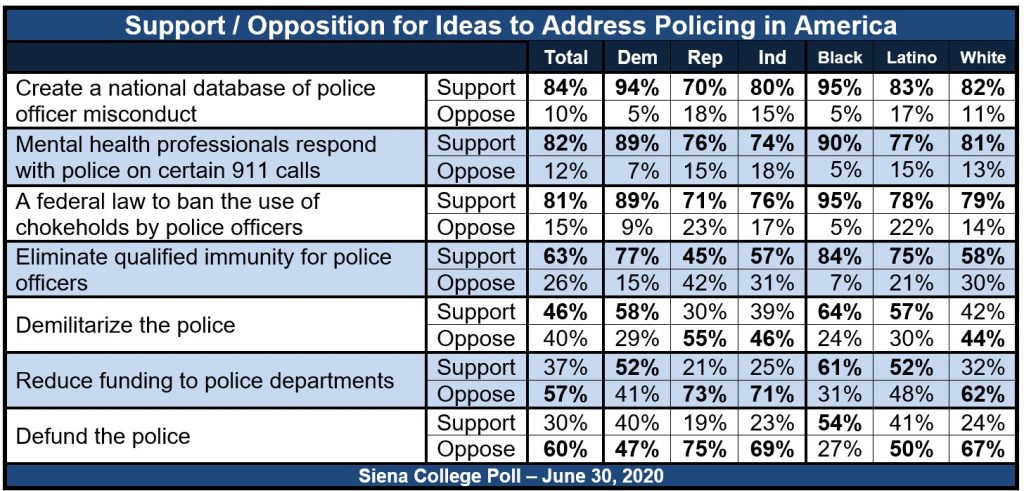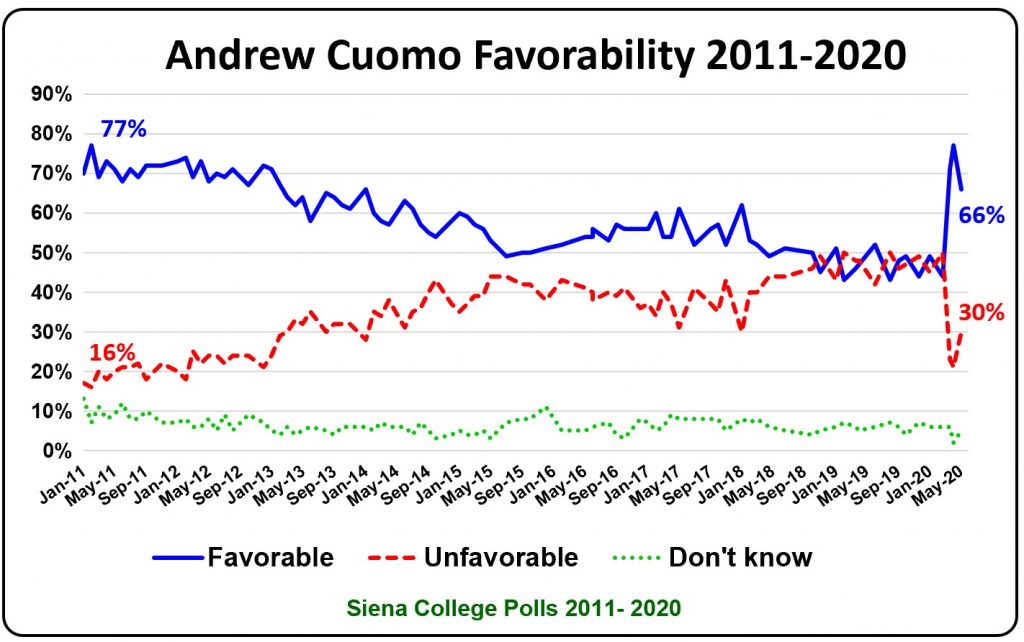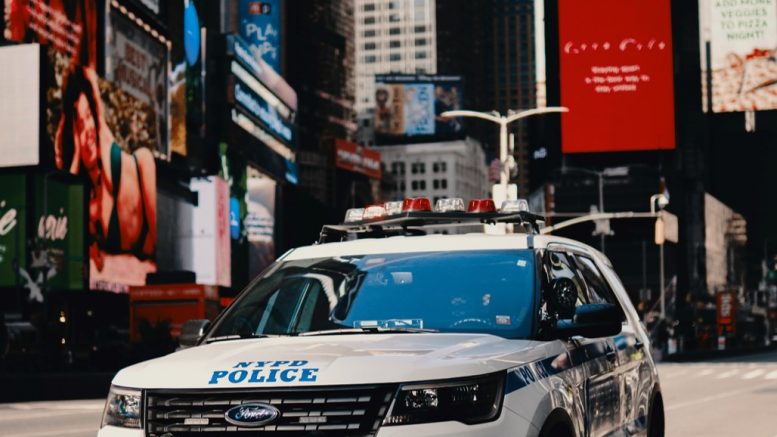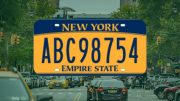- By 60-35%, NYers Say Floyd & Brooks Killings Part of Broader Pattern of Excessive Police Violence Towards Black People, Not Isolated Instances; NYers: Systemic Racism Is Very (51%) / Somewhat (30%) Serious Problem
- More than 80% Support: National Police Misconduct Database, Federal Ban on Chokeholds & Mental Health Professionals Riding with Police on Certain Calls
- Strong Support for Recent Demonstrations Across the Nation, 60-36% 80% Say Recent New NY Laws to Improve Policing Will Be Good for NY
- When Seeing Police Officer, 51% of White NYers Feel More Secure & 13% Less Secure; However, 46% of Black NYers Feel Less Secure & 13% More Secure
Loudonville, NY. By a 60-35 percent margin, New Yorkers say the recent killings of George Floyd and Rayshard Brooks ‘are part of a broader pattern of excessive police violence toward Black people,’ rather than ‘tragic isolated instances.’ Eighty-one percent say that systemic racism in the country is a very (51 percent) or somewhat (30 percent) serious problem, while 18 percent say it’s not very (10 percent) or not at all (eight percent) a serious problem, according to a new Siena College Poll of registered New York State voters released today.
Creating a national database of police officer misconduct (84-10 percent), a federal law to ban the use of chokeholds by police officers (81-15 percent) and having mental health professionals respond alongside police officers to 911 calls dealing with homelessness, drug addiction and mental illness (82-12 percent) all have broad bipartisan support. Eliminating qualified immunity (63-26 percent support) has strong support from Democrats and independents and small plurality support from Republicans. A majority of New Yorkers oppose reducing police funding and strongly oppose defunding the police, while a plurality supports demilitarizing the police.
“While a clear majority of New Yorkers, 60 percent, say the recent killings of George Floyd and Rayshard Brooks are part of a pattern of excessive police violence toward Black people, there are widespread racial, partisan and geographic differences,” said Siena College pollster Steven Greenberg. “Eighty percent of Democrats say it’s part of a broader pattern, while 57 percent of Republicans and 48 percent of independents, a plurality, say the deaths are tragic isolated instances. Although 53 percent of white voters say it is part of a pattern, that view is held by 64 percent of Latinos and 91 percent of Black New Yorkers. New York City voters see a pattern 72-23 percent, while upstaters agree 55-39 percent and downstate suburbanites are closely divided.”
“While there is some disagreement by race, party, geography, and age as to whether systemic racism in the country is a ‘very’ or ‘somewhat’ serious problem, at least two-thirds of voters agree – regardless of race, party, region or age – that systemic racism is at least a somewhat serious problem,” Greenberg said. “At least two-thirds of Democrats, Blacks, Latinos, voters under 35 and New York City voters say systemic racism is a very serious problem. Fewer than 30 percent of any demographic group says that systemic racism is not a very or not at all a serious problem, except for self-identified conservatives, of whom 43 percent say it is not a serious problem.
“Bringing it closer to home, 60 percent say people of color are not treated fairly by the criminal justice system in New York, with only a majority of Republicans and conservatives saying people of color are treated fairly by the state’s criminal justice system. Stunningly, though not necessarily surprisingly, 92 percent of Blacks and 72 percent of Latinos say people of color are treated unfairly,” Greenberg said. “The current 60-29 percent margin saying ‘not fairly’ compares to 52-40 percent, a much narrower margin, back in January 2015.”

“At least 70 percent of Democrats, Republicans, independents, Blacks, Latinos, and whites agree on each of three police reforms: creating a national database of police misconduct; a federal law banning chokeholds by police; and, having mental health professionals respond with police on calls involving homelessness, drug addiction or mental health,” Greenberg said. “Support for eliminating qualified immunity is also very strong, 63-26 percent, although white and independent support falls below 60 percent and Republicans barely support, 45-42 percent.
“Demilitarizing the police is supported 46-40 percent, with support coming from Democrats, Blacks and Latinos. Those same groups support reducing police department funding, although that is opposed by a majority of New Yorkers. Defunding the police is opposed two-to-one and is only supported by Blacks,” Greenberg said.
Blacks and Whites Have Very Different Reactions When Seeing a Police Officer
“Overall, 42 percent of New Yorkers feel more secure when they see a police officer, compared to 20 percent who feel less secure and 35 percent are unaffected. But that doesn’t tell the full story. When Blacks see a police officer, 46 percent feel less secure and only 13 percent feel more secure. It is the mirror image for whites with 51 percent feeling more secure and only 13 percent less secure. Pluralities of Latinos and voters under 35 also feel less secure,” Greenberg said. “It is certainly worth noting when one in five New Yorkers – including nearly half of Black New Yorkers – feels less secure simply from seeing one of New York’s Finest or another police officer.”
New Yorkers Strongly Support Demonstrations Taking Place Across the Nation
“About three-quarters of Democrats, New York City voters and voters under 35, as well as 88 percent of Blacks, support the recent demonstrations as mainly peaceful with an important message. However, a majority of Republicans oppose the demonstrations because too many have turned to rioting and looting. Independents and downstate suburbanites are closely divided, while clear majorities of whites and voters over 35 support the demonstrations,” Greenberg said. “One in five New Yorkers say that either they themselves or a member of their household participated in at least one rally over the last few weeks.”
Overwhelming Support for Recently Passed New York Laws to Improve Policing in NYS
“By an overwhelming 80-13 percent margin, voters say the recently passed legislation – including a ban on chokeholds by police, making disciplinary measures public and having a special unit in the State Attorney General’s office to investigate and prosecute civilian killings by police officers – will be good for New York. At least two-thirds of voters from every race, party, region, and age agree,” Greenberg said.
Cuomo Gets Thumbs Up, Trump Thumbs Down and de Blasio Thumbs Sideways on Floyd Killing Response
“New Yorkers approve of the job Governor Andrew Cuomo is doing in response to the George Floyd killing 57-24 percent. They disapprove of the job President Donald Trump has done, 64-27 percent. And New York City voters are split on Mayor Bill de Blasio’s handling, 44-43 percent approve,” Greenberg said. Cuomo Ratings Little Changed from Last Month; Remain Strong Cuomo’s favorability rating is 65-31 percent, little changed from 66-30 percent last month. His job performance rating is 62-37 percent, little changed from 63-36 percent. And voters approve his overall handling of the pandemic 76-21 percent, exactly the same as in May.

“Voters continue to give Cuomo high grades – strong favorability and job performance ratings – and continue to strongly approve of his overall handling of the pandemic,” Greenberg said. “While voters still give Cuomo a slightly negative rating for his handling of nursing homes, they give him exceptionally positive ratings for his communicating with New Yorkers about the pandemic and for his reopening plans. His plans for reopening New York were viewed positively 64-34 percent last month, that’s now up to 70-29 percent.”
Odds & Ends
- By a 70-22 percent margin, voters have a favorable view of their local police, down from 81-16 percent, the last time Siena asked this question in January 2015. While more than three-quarters of whites and 55 percent of Latinos have a favorable view, Blacks are closely divided, with 43 percent favorable and 47 percent unfavorable, down from 60-38 percent favorable in January 2015.
- Voters have a favorable view of the Black Lives Matter movement 66-26 percent, including 90 percent of Blacks, 69 percent of Latinos and 60 percent of whites. Republicans have an unfavorable view, 41-49 percent and conservatives view the BLM movement unfavorably 29-61 percent.
- New Yorkers continue to see the bigger danger for the state in opening too quickly rather than too slowly, 62-31 percent, down slightly from 65-32 percent last month.
- Joe Biden maintains the exact same 57-32 percent lead over President Trump that he held last month. A plurality of voters, 46 percent, now think Trump will not win re-election, compared to 42 percent who think he will. Last month, voters thought he would win re-election 46-41 percent.
- Voters say New York is on the right track and not heading in the wrong direction 52-38 percent, down a little from 56-34 percent last month.
- New Yorkers are currently more negative about the direction of the country, 28-64 percent, than at any time since October 2017, when it was 26-65 percent.
- Voters have a favorable view of the New York State Assembly 45-30 percent, down from 57-29 percent in April, and they view the State Senate favorably 45-34 percent, down from 58-31 percent in April.
This Siena College Poll was conducted June 23-25, 2020 among 806 New York State registered voters with 472 voters contacted through a dual frame (landline and cell phone) mode and 334 responses drawn from a proprietary online panel (Lucid) of New Yorkers. Telephone calls were conducted in English and respondent sampling was initiated by asking for the youngest person in the household. Telephone sampling was conducted via a stratified dual frame probability sample of landline (ASDE) and cell phone (Dynata) telephone numbers within New York State weighted to reflect known population patterns. Data from both collection modes (phone and web) was merged and statistically adjusted by age, party by region, race/ethnicity, and gender to ensure representativeness. It has an overall margin of error of +/- 3.9 percentage points including the design effects resulting from weighting. The Siena College Research Institute, directed by Donald Levy, Ph.D., conducts political, economic, social, and cultural research primarily in NYS. SCRI, an independent, non-partisan research institute, subscribes to the American Association of Public Opinion Research Code of Professional Ethics and Practices. For more information, call Steve Greenberg at (518) 469-9858. For survey crosstabs: www.Siena.edu/SCRI/SNY.





